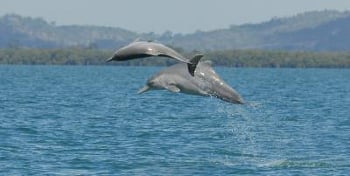This article is more than 1 year old
Shy, bashful HUMPBACK DOLPHINS expose themselves to boffins
Fourth variety of brainy mammals spotted off northern Australia
A previously unknown species of humpback dolphin has been blithely swimming the waters off northern Australia, according to scientists.
A research team made up of scientists from the Wildlife Conservation Society (WCS), the American Museum of Natural History and other groups set out to figure out the number of distinct types of humpback dolphins using physical features and genetic data.

New humpback dolphin species. Credit: Guido Parra
The Atlantic humpback dolphin has already been recognised, but the boffins found that the Indo-Pacific variety should actually be broken up into three different species, one of which is completely new.
"Based on the findings of our combined morphological and genetic analyses, we can suggest that the humpback dolphin genus includes at least four member species," said Martin Mendez, assistant director of WCS' Latin America and the Caribbean Program and lead author of the study.
"This discovery helps our understanding of the evolutionary history of this group and informs conservation policies to help safeguard each of the species."
The researchers reckon there are at least four kinds of humpback dolphins, the Atlantic (Sousa teuszii) and the Indo-Pacific (Sousa plumbea) and also another type of Indo-Pacific (Sousa chinensis), which lives in eastern Indian and western Pacific oceans, and the fourth as-yet-unnamed new species.
"New information about distinct species across the entire range of humpback dolphins will increase the number of recognised species, and provides the needed scientific evidence for management decisions aimed at protecting their unique genetic diversity and associated important habitats," said Howard Rosenbaum, director of WCS' Ocean Giants Program.
The team used 180 skulls of dolphins gathered from beached dolphins and museum specimens to come to their conclusions, which were published in Molecular Ecology. ®
